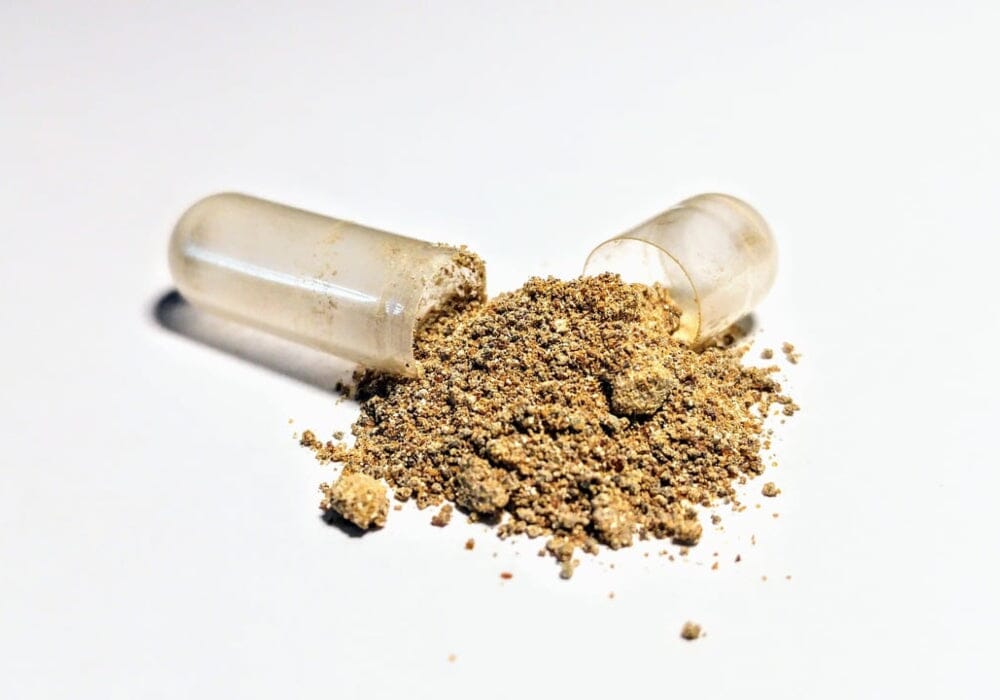Scientists are studying this ancient herbal remedy for its potential benefits for sleep, mood, anxiety, brain fog and hot flashes.
Ashwagandha, also known as Indian ginseng or winter cherry, is a shrub native to India whose root has been used for thousands of years in traditional Ayurvedic medicine.
More recently, western scientists have begun to study ashwagandha for its potential health benefits and there’s some evidence that it may help with menopause symptoms including poor sleep, anxiety, low mood, brain fog and hot flashes.
Researchers are still investigating how ashwagandha interacts with your body, but some studies suggest that it may have an impact on levels of reproductive hormones including oestrogen.
Below we’ll look at this in more detail, as well as explaining how to choose the best ashwagandha supplements and considering any possible side effects.
Ashwagandha is one of the key ingredients in Better Night, an expert-formulated supplement designed to improve anxiety, mood and sleep during perimenopause and after menopause.
To find out more, visit Better Night. And for 10% off your first order, use the discount code WELCOME10.
How does ashwagandha affect your hormones?
Scientists are still trying to understand exactly how ashwagandha affects your body chemistry and it’s possible different mechanisms are responsible for different potential benefits.
However, some research suggests that ashwagandha may influence levels of hormones including oestrogen. This could be significant as reduced oestrogen levels are the main cause of many perimenopause and menopause symptoms.
In one study, women with perimenopausal symptoms who took daily doses of ashwagandha significantly increased their circulating oestrogen after 8 weeks.
The same study found that ashwagandha lowered levels of follicle-stimulating hormone (FSH), the hormone that triggers the production of oestrogen in your ovaries. High levels of FSH are associated with perimenopause and menopause.
Levels of luteinising hormone (LH), which your body releases alongside FSH, were also lower.
One reproductive hormone that didn’t change was testosterone. Although research suggests that taking ashwagandha can increase testosterone in men, based on this study and others it doesn’t seem to affect levels in women.
However, more research is needed before experts fully understand the effects of ashwagandha on women’s hormones, and other functions around the body.
6 menopause symptoms ashwagandha may help with
Here we’ll look at what scientific studies have to say about some of the potential benefits of ashwagandha for certain perimenopause and menopause symptoms.
1. Stress and anxiety
Increased stress and anxiety are common symptoms of perimenopause and menopause. You might have unexplained feelings of fear and dread and may even experience panic attacks.
Several studies have shown that taking a daily ashwagandha supplement can reduce both stress and anxiety.
In one study, women and men with a history of chronic stress took either 300 milligrams (mg) of ashwagandha root or a placebo twice a day. After 60 days, those in the ashwagandha group saw their stress scores drop by an average of 44%. They also had significant reductions in their anxiety scores compared with the placebo group.
Although the study was relatively small, these findings have been repeated in several other trials. One study also looked at the effects of two different doses of ashwagandha. While a total daily dose of 250 mg showed improvements in both stress and anxiety, results were significantly better with a dose of 600 mg.
Interestingly, these studies also showed a reduction in participants’ levels of the stress hormone cortisol, suggesting that their improved experiences of stress and anxiety were linked to real biological changes.
2. Sleep
Poor sleep during perimenopause or menopause can be the result of other symptoms, including anxiety, stress, night sweats or pain. But difficulty getting to sleep, waking up during the night or waking up too early are also issues you may experience even without these other symptoms.
In one of the same studies that looked at ashwagandha’s impact on stress and anxiety, researchers also found that it improved sleep quality, as rated by participants when they woke up each morning. And, again, higher doses of ashwagandha led to bigger improvements.
Other studies have produced similar results, with some finding that ashwagandha had a greater effect for people who had been diagnosed with insomnia.
3. Mood
Along with stress and anxiety, menopause and perimenopause are often accompanied by other mental health symptoms, including a low mood, mood swings and irritability, emotional numbness, depression, or feelings of reduced self-esteem and loss of confidence.
One study looking at a range of symptoms in perimenopausal women found that those who took daily supplements containing ashwagandha root extract saw significant improvements in both depressed mood and irritability after 8 weeks.
Other studies appear to back this up, with participants who’ve taken ashwagandha supplements consistently having improved scores on scales that measure depression alongside stress and anxiety.
4. Brain fog
Many women going through perimenopause will recognise the symptoms of ‘brain fog’ – trouble concentrating and thinking clearly, and problems with short-term memory.
Some research suggests ashwagandha may help with these sorts of cognitive issues.
One study found that perimenopausal women who took daily ashwagandha supplements for 8 weeks saw significant reductions in their overall mental exhaustion.
Meanwhile, a review of multiple studies involving a range of participants concluded that ashwagandha boosted performance in cognitive tasks, and improved attention, reaction time and higher level functioning.
5. Hot flashes
Sudden hot flashes and night sweats are the most common perimenopause symptom, experienced at some point by 75–80% of women.
A study looking at the effect of ashwagandha on a range of perimenopause symptoms found that participants who took daily supplements had significantly fewer instances of hot flashes and night sweats, as well as less intense symptoms.
6. Maintaining a healthy weight
Weight gain or a change in body composition – such as an increase in your ratio of body fat to muscle – is not uncommon during perimenopause or menopause.
While there isn’t a great deal of research looking at the impact of ashwagandha on weight management, one small study involving people with chronic stress had encouraging results.
After taking 600 mg of ashwagandha each day for 8 weeks, participants had lost 3% of their body weight and reduced their body mass index (BMI) by a similar amount. In both cases, this was more than twice the reduction seen in the placebo group.
The people in the ashwagandha group also reported significantly fewer food cravings and less instances of ‘emotional eating’.
Although it’s possible ashwagandha may help with weight management, the best ways to maintain a moderate weight are eating a balanced diet, including a wide variety of plants, and getting regular exercise.
What is the best type of ashwagandha for menopause?
The ashwagandha powder traditionally used in Ayurvedic medicine, and most often tested in scientific studies, is made from the root of the plant. However, ashwagandha supplements can vary in quality and may sometimes include the leaves rather than the root.
The form of ashwagandha we would recommend is called KSM-66 ashwagandha. It’s made only from the root and is a full-spectrum product, meaning it includes the broadest range of different extracts, at the highest concentrations.
It’s also produced using a unique ‘green chemistry’ extraction process that avoids harsh chemicals like alcohol or other solvents.
KSM-66 ashwagandha is used in the menopause supplement Better Night.
Does ashwagandha have side effects?
Numerous randomised controlled trials – the gold standard for measuring a treatment’s effectiveness – have concluded that supplements made from ashwagandha root are safe to take. And an independent review of studies has backed this up.
The US National Institutes of Health (NIH), meanwhile, says that ashwagandha is likely to be safe to take for up to 3 months but points out that not many studies have tested it for longer than this.
Side effects are rare and usually minor. In one study involving 91 women, 3 of those who had taken ashwagandha experienced short-term digestive symptoms. However, these symptoms were reported by more women in the placebo group.
In another study, 2 of 52 participants had side effects such as giddiness, blurred vision or acid reflux but these were also mild and temporary.
In a handful of cases, people taking non-clinical ashwagandha supplements have experienced mild to moderate liver issues. However, it’s not clear whether these products contained pure ashwagandha root or leaves, and experts concluded that in some instances other unknown ingredients could have been involved.
Who shouldn’t take ashwagandha?
According to the NIH, you shouldn’t take ashwagandha if you:
- are pregnant or breastfeeding
- are about to have surgery
- have an autoimmune disease
- have a thyroid disorder
Men with hormone-sensitive prostate cancer should also avoid ashwagandha.
There’s some evidence that ashwagandha could interact with certain medications, including those that treat high blood pressure, diabetes or thyroid problems, sedatives, anti-seizure drugs or those that supress your immune system.
If you’re on any medication, it’s important to talk to your doctor before using a supplement.
Summary
Ashwagandha root is a traditional herbal remedy that’s now being studied for its potential health benefits.
Early research suggests it may help with perimenopause and menopause symptoms including poor sleep, stress and anxiety, low mood, brain fog and hot flashes.
Ashwagandha is safe to take for most people but you should avoid it if you’re pregnant, have certain health conditions or are taking particular types of medication.
The menopause supplement Better Night contains the best-studied form of ashwagandha, along with a range of other expert-chosen herbal ingredients, minerals and vitamins to help improve sleep, mood and anxiety.
For 10% off your first order, visit Better Night and use the discount code WELCOME10.









